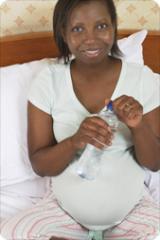NIEHS/EPA University of Illinois Children’s Center: BPA May Affect a Woman’s Reproductive Health
November 2014 - University of Illinois, one of the National Institute of Environmental Health Sciences (NIEHS)/U.S. Environmental Protection Agency (EPA) Children’s Environmental Health and Disease Prevention Research Centers was highlighted in a NY Times article for their research on how bisphenol A or BPA, could potentially affect women’s health. The research showed that female mice continually exposed to BPA at a level comparable to humans in the U.S., had negative changes in reproductive health, with fewer and smaller follicles, which contain the eggs. The rodents also showed decreased levels of a hormone needed for normal reproductive development and an unusually shortened period of producing viable eggs. While research continues on the effects of BPA on human health, the article cites a couple of studies showing reduced numbers of fertile eggs. BPA is commonly found in plastic water bottles, thermal coatings on store receipts, and canned food linings.
The NIEHS/EPA Children’s Centers are jointly funded research centers that investigate how environmental factors affect children’s health, from their development before birth, through childhood and into adolescence. They are also part of EPA’s Sustainable and Healthy Communities (SHC) Research Program, which provides useful science and tools for decision makers at all levels to help communities advance sustainability as well as achieve regulatory compliance. SHC is collaborating with partners to conduct research that will result in science-based knowledge to guide decisions at the federal, regional, state and community level that will better sustain a healthy society and environment in America's communities.
Full New York Times article: In Plastics and Cans, a Threat to Women Exit
For more information about the EPA/NIEHS University of Illinois Children’s Center visit: NIEHS/EPA Children's Environmental Health and Disease Prevention Research Centers (CEHCs)

